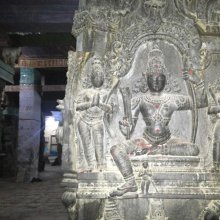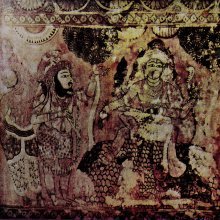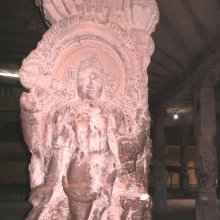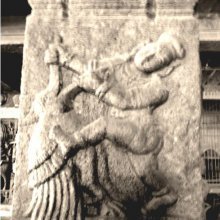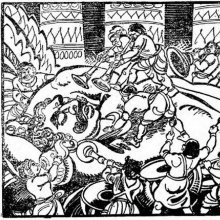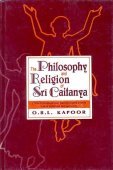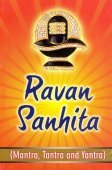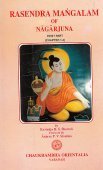Him, Hiṅ, Hin, Hiṃ: 8 definitions
Introduction:
Him means something in Buddhism, Pali, Hinduism, Sanskrit, Jainism, Prakrit, Hindi. If you want to know the exact meaning, history, etymology or English translation of this term then check out the descriptions on this page. Add your comment or reference to a book if you want to contribute to this summary article.
Him has 8 English definitions available.
Images (photo gallery)
(+191 more images available)
Languages of India and abroad
Sanskrit dictionary
[Deutsch Wörterbuch]
Source: Cologne Digital Sanskrit Dictionaries: Böhtlingk and Roth Grosses Petersburger WörterbuchHiṅ (हिङ्):—interj. hiṅkar einen gurrenden Laut ausstossen (wie die Kuh gegen das Kalb): hiṅṅakṛṇot [Ṛgveda 1, 164, 28.] hiṅkṛṇvatī [27.] Im Ritual vom Ausstossen von hiṅ und ähnlichen wiehernden Lauten [Atharvavedasaṃhitā 9, 6, 45.] [The Śatapathabrāhmaṇa 1, 4, 1, 1. 2. 4, 2, 2, 11.] hiṃ cakāra [2, 2, 4, 12] (wohl hiṅ zu lesen; vgl. hiṅcūkruḥ [Chāndogyopaniṣad 1, 12, 4]). hiṅkṛtya [9, 1, 2, 34. 14, 9, 3, 9.] [Taittirīyasaṃhitā 2, 5, 7, 1.] hiṃ3 iti hiṅkṛtya [Aśvalāyana’s Śrautasūtrāni 1, 2, 3. 5.] partic. hiṅkṛta [Vājasaneyisaṃhitā 22, 7.] [Pañcaviṃśabrāhmaṇa 12, 10, 13.] abhihiṃkar angurren, zuwiehern [Kauśika’s Sūtra zum Atuarvaveda 62.] jātaṃ putraṃ paśavo bhihiṅkurvanti [Pañcaviṃśabrāhmaṇa 12, 10, 13.] [Kāṭhaka-Recension 27, 9.] [Kauṣītakyupaniṣad 2, 11.]
Sanskrit, also spelled संस्कृतम् (saṃskṛtam), is an ancient language of India commonly seen as the grandmother of the Indo-European language family (even English!). Closely allied with Prakrit and Pali, Sanskrit is more exhaustive in both grammar and terms and has the most extensive collection of literature in the world, greatly surpassing its sister-languages Greek and Latin.
See also (Relevant definitions)
Starts with (+641): Him-champa, Him-him, Hima, Hima-marubhumi, Himabaluka, Himabha, Himabhanu, Himabhas, Himabhra, Himabhubhrit, Himabhudhara, Himabja, Himacalagriha, Himacalaprishtha, Himacalapura, Himacalasuta, Himacalavilasini, Himacalendra, Himacandra, Himacandrashila.
Ends with (+185): Abharavashim, Adakushim, Adhim, Adhimbidhim, Adhimmadhim, Adhinnamadhim, Adoshimpadoshim, Afim, Ahe Ahe Nahim Nahim, Ahe-ahe-nahim-nahim, Ahirnishim, Aishim, Ajadivasim, Ajavarshim, Akshabokshim, Akshambokshim, Amshim, Anandemshim, Arthaarthim, Ashimpashim.
Full-text (+11158): Hinkara, Hims, Apahimkara, Abhihinkara, Him-him, Hikkartri, Pratihimsa, Vihimsra, Abhitigmarashmi, Upahims, Himsira, Pratyavarudhi, Tvadrik, Himsya, Suhims, Abilam, Himsana, Himsaka, Hikkriya, Pracodana.
Relevant text
Search found 516 books and stories containing Him, Hīm, Hīṃ, Hiṅ, Hin, Hiṃ; (plurals include: Hims, Hīms, Hīṃs, Hiṅs, Hins, Hiṃs). You can also click to the full overview containing English textual excerpts. Below are direct links for the most relevant articles:
Chandogya Upanishad (Shankara Bhashya) (by Ganganatha Jha)
Section 2.2 (second khaṇḍa) (three texts) < [Chapter 2 - Second Adhyāya]
Section 2.21 (twenty-first khaṇḍa) (four texts) < [Chapter 2 - Second Adhyāya]
Section 2.9 (ninth khaṇḍa) (eight texts) < [Chapter 2 - Second Adhyāya]
Satapatha-brahmana (by Julius Eggeling)
Kanda I, adhyaya 4, brahmana 1 < [First Kanda]
Kāṇḍa IV, adhyāya 5, brāhmaṇa 9 < [Fourth Kāṇḍa]
Kāṇḍa IV, adhyāya 4, brāhmaṇa 4 < [Fourth Kāṇḍa]
Chandogya Upanishad (Madhva commentary) (by Srisa Chandra Vasu)
First Adhyaya, Twelfth Khanda (4 mantras)
First Adhyaya, Thirteenth Khanda (3 mantras)
Bharadvaja-srauta-sutra (by C. G. Kashikar)
Rig Veda (translation and commentary) (by H. H. Wilson)
Baudhayana Dharmasutra (by Georg Bühler)
Related products
(+30 more products available)
